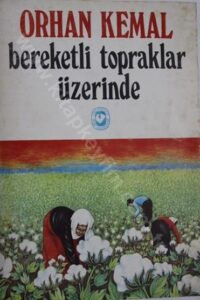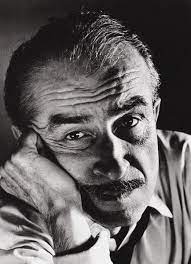Novelist (b. 15 September 1914, Ceyhan / Adana – d. 2 June 1970, Sofia / Bulgaria)
Orhan Kemal, (Mehmet Raşit Öğütçü) writer of short stories and novels was born in Adana in 1914 and died in Sofia in 1970.

WORKS:
SHORT STORY: Ekmek Kavgası (Fight for Bread, 1949), Sarhoşlar (Drunkards, 1951), Çamaşırcının Kızı (The Laundress’ Daughter, 1952), 72. Koğuş (Ward 72, 1954), Grev (Strike, 1954), ArkaSokak (Back Street, 1956), Kardeş Payı (A Fair Share, 1957), Babil Kulesi (The Tower of Babel, 1957), Dünyada Harb Vardı (There Was War on Earth, 1963), İşsiz (Redundant, 1966), Önce Ekmek (Bread First, 1968), Küçükler ve Büyükler (The Little and the Great, 1971).
NOVEL: Baba Evi (My Father’s House, 1949), Avare Yıllar (Idle Years, 1959), Murtaza (Murtaza, 1952), Cemile (Cemile, 1952), Bereketli Topraklar Üzerinde (On Fertile Lands, 1954), Suçlu (Guilty, 1957), Devlet Kuşu (Windfall, 1958), Vukuat Var (There’s a Crime, 1959), Gâvurun Kızı (The Infidel’s Daughter, 1959), Küçücük (Very Little, 1969), Dünya Evi (Marriage, 1960), El Kızı (The Foreigner’s Daughter, 1960; filmed and broadcast in a television series, 1989), Hanımın Çiftliği (The Mistress’ Farm, 1961), Eskici ve Oğulları (The Junk Dealer and His Sons, 1962; later published with the title Eskici Dükkânı – The Junk Shop), Gurbet Kuşları (Birds of Foreign Lands, 1962), Sokakların Çocuğu (Kid of the Streets, 1963), Bir Filiz Vardı (There Was a Filiz, 1965), Müfettişler Müfettişi (Inspector of the Inspectors, 1966), Yalancı Dünya (False World, 1966), Evlerden Biri (One of the Houses, 1966), Arkadaş Islıkları (Friend’s Whistles, 1968), Sokaklarda Bir Kız (A Girl on the Streets, 1968), Üç Kağıtçı (Cheater, 1969), Kötü Yol (Evil Way, 1969), Kaçak (Fugitive, 1970), Tersine Dünya (Reversing World, 1986).
PLAY: İspinozlar (Snowbirds, staged 1964; published 1965, also staged with the title Yalova Kaymakamı – The Head Official of Yalova), 72. Koğuş (Ward 72) Bekçi Murtaza (Murtaza the Watchman) Eskici Dükkânı (The Junk Shop) and Kardeş Payı (A Fair Share) were adapted for the stage and performed at theatres in Ankara between the years 1967-71.
AUTOBIOGRAPHY- MEMOIR: Nazım Hikmet’le Üç Buçuk Yıl (Three and a Half Years With Nazım Hikmet, 1965), Senaryo Tekniği ve Senaryoculuğumuzla İlgili Notlar (Technique of Script Writing and Notes on Our Script Writing, 1963), İstanbul’dan Çizgiler (Lines from İstanbul, 1971).
JOURNAL-POETRY: Yazmak Doludizgin (Writing at Full Speed, journals, poems, 2002).
“I think to die is to live in an undesirable world. By dying twenty-four times every twenty-four hours.”
― Orhan Kemal
“Everybody giggles gum, but gypsy girl enjoys it”
― Orhan Kemal
“72. As in all prisons, the ward was the poorest ward of the prison, as it was the poorest. The people of this place are worms that have stood up.”
― Orhan Kemal, 72.Koğuş
“I would give my life for the captain. Everyone has their own honor!
Terrible looked at him:
“Is it edible?”
“Of course he has the honor. If we become Adam’s father, God is this friend…”
― Orhan Kemal, 72.Koğuş
“forty-five to fate”
― Orhan Kemal
“They steal the prophet from Allah’s pocket. Once they get used to it, it’s over. Your heart is already pudding, they’ve bent their necks and you can’t stand crying. Do you feel sorry for Allah’s mercy?”
― Orhan Kemal, 72.Koğuş
“Spring has come again, then summer. The sun, the owner of the orphans, came just in time.”
― Orhan Kemal
“Everyone chews gum, but the gypsy girl enjoys it.”
― Orhan Kemal, Avare Yıllar
“Suddenly we found ourselves in revolt, or so it seemed to me. People with felt hats and pompons are running around, rubbing the ground, ‘We don’t want it, we don’t want this government!’ they were shouting. If anyone asked, they had strictly instructed me to say that I was the coal miner’s son. My grandmother had hidden all my father’s books, papers, photographs, swords, rifles, or rather, everything that belonged to my father in Ankara, under the cotton of the beds, in the attic. They said that the bullets fired from Alaettin hill broke the windows of the upper floor of our house and went to the Armenian school, and the bullets fired from the Armenian school went through the upper floor windows of our house and went to the Alaettin hill. We could see heads with coarse moustaches in the windows of the school, and we slept all day and all night on the stairs of the lower floor. One day we heard thatThe rebels tied the governor to the barn. ‘We want sharia, we don’t want this ignorant government, we don’t want atheists, we want sharia!’ We heard screams drifting and the incessant gunfire. Doors were broken, people were being strangled.
Days and days passed… ‘We do not want, we do not want, we do not want!’ Their voices resounded in the streets and one day, screams, gunshots, and the news ‘The National Forces were coming’ came out lightning. Involuntarily, the cries ceased, the rough-booted feet fled through the streets, the gunfire ceased. One sunny morning, my brother and I mingled with the people in front of the house, handkerchiefs in our hands. The hooves of strong horses with foaming mouths covered everything. A wild applause… Old women, children, young women, girls were crying with joy, the crowd was shaking with shouts of joy. Horsemen were passing by, horsemen… Under the bright sun, horsemen with their gourds, caps, and mustaches were passing. Then the unwilling ones… The sharia bouncers, with their hands tied behind their backs, with trouser legs and felt hats… Then the trolleys… In the trolleys,bloody corpses cut off from their necks… That day I cried so much that my voice was hoarse and I fell ill. In front of the Armenian school, the children began to play a kind of mortise with cartridge cases. The streets were filled with empty cartridge cases…”
― Orhan Kemal, Baba Evi
“What and what was my father? I do not know. With his silver-knotted cane, his yellow purse, his red wicker fez, and his eyebrows that always frown when he looks at me, he was just a big-bodied fear to me. His frowning, jet-black eyebrows… My father was as big and strong as a giant!”
― Orhan Kemal, Baba Evi
“Tell me,” my father roared again, how dare you do this? Didn’t you think, didn’t you think that my honor and dignity are at stake? What if tomorrow they take you and imprison you? What if they send not only you but also me to the courts with you? What ignorance is this, my Lord, what an inconsistency! How to break the seal of the government, how to dare!
He divorced my mother that night and sent her to my uncle’s house early in the morning. That very evening, my grandmother and my little aunt came to the farm, and they both had a look inside the house from both sides. Then my grandmother tucked her skirts around her waist, giving orders to the maids to have the house thoroughly washed. They were content with their world. They were unleashing their Vara yoga laughter.
— Oh, what a scumbag, what a scumbag, my Lord! Such a woman per enemy!
Or:
— To be honest, my son Eyüp had patience. It is not worth living with this scruffy wife.
— Your wife, they said, united with the locals and emptied the sub-house one-mile… The town is shaking, the police are going to raid it tomorrow, just so you know!
My mother had already forgiven my father:
– He said, “Let him beat him, it’s a man… It’s not his fault, it’s the other person whose neck is cut off… If he beats me after understanding and listening, what should I do, then I’ll accept my punishment.”
― Orhan Kemal, Baba Evi
“Fort is on it,” said Veli. “I own this middleman’s shop,” he said.
“Did he say mine?”
“It’s mine, he said, for the sake of writing, liar. I told you the other day, Haji Emmi, he has the robbery, he has the lie, he has the dishonor. In the past, the agha said: ‘Veli, my son’ he said, ‘my eyes do not drink water from this Gafur’. ‘You are my special man. Oh my son, keep an eye on the shop while I’m gone!”
Hadji chuckled:
“I told you the other day, veli, run to the rabbit, keep it in writing, they say. Don’t listen. Hi, mi, di, don’t connect with bold sidk. Why are you dire, I’ve been here since Mustafa Kemal Pasha corrupted the Greek, I’m a bird of exile. I’ve seen so many great Hüseyin Efendis. Whether it’s a city man or a female tongue me, you won’t believe it!”
― Orhan Kemal, Gurbet Kuşları



















